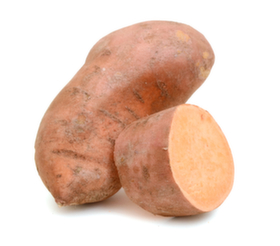
Sweet Potato, cooked, chopped or mashed
Peruvians have been using sweet potatoes since 750 B.C. Sweet potatoes are large, reddish-orange roots. They can also be found in yellow, orange, brown and purple. Color-related pigments, including anthocyanin, give sweet potatoes their anti-inflammatory properties. They are good for cardiovascular health, diabetes, cancer prevention and blood clotting.
Sweet potatoes are a great source of naturally occurring vitamin A. The antioxidants in sweet potatoes help eliminate free radicals from the body, protecting cells from damage. Glycosides in sweet potatoes give them antibacterial and anti fungal properties.
Beta-carotene in sweet potatoes helps prevent cancer, heart disease, asthma and rheumatoid arthritis. Sweet potatoes contain carotenoids, which stabilize blood sugar and lower insulin resistance. They can lower risks posed by heavy metals and oxygen radicals. As a result, sweet potatoes are beneficial for those with irritable bowel syndrome or ulcerative colitis. The phytonutrients in sweet potatoes have a positive impact on fibrinogen, which is necessary for blood clotting. Sweet potatoes help improve blood sugar regulation, which is especially good for those with Type II diabetes.